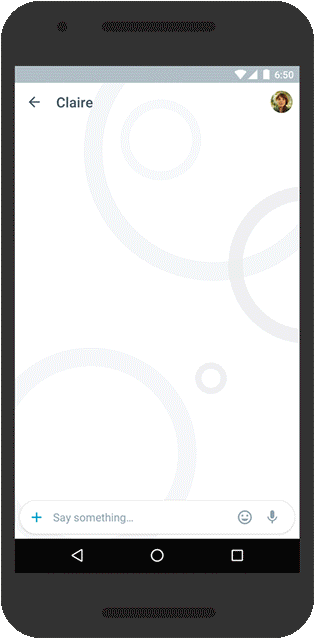Google’s Annual I/O Developer Conference is big news when it comes to tech and software.
This year’s event was no different, with major announcements regarding all of the Alphabet subsidiary’s platforms. Get the scoop on day one of the conference below.
Google Takes on Amazon Echo

In what can only be seen as an effort to once and for all enter the “smart home” business, Google announced Google Home, a web-ready AI hub meant to connect with and control all of a user’s devices and offer voice commands. Google has delved into home technology before with its Alphabet-owned cousin Nest Labs and the Chromecast line of streaming devices, but this is their first attempt to enter the space with the big guns (AI) drawn and ready. While the Amazon Echo with its Alexa assistant is popular, we’ll have to see if it can keep up with the artificial intelligence and data mining powerhouse that Google has become over the years.
VR Coming to Android

The Samsung Galaxy S7 is already running commercials about how it’s the world’s first VR-ready smartphone, but Google apparently has other plans for bringing users into the virtual ether. Announcing its “Daydream” virtual reality platform (powered by Android), Google is diving head first into consumer VR tech. Currently, their only major competitors are the pricey and bulky Oculus Rift and HTC’s VR offering, Vive. The Daydream demo presented at I/O 2016 was an impressive display featuring an interactive VR menu screen and games that require user hand movements with a “Wii Remote” style device.
Assistant Challenges Siri for AI Throne
Despite being a leader in search engine and AI software, Google hasn’t quite had the success with AI personal assistants like Apple has with its Siri program. They hope to change this with the announcement of their new AI assistant, aptly named “Assistant.” The demo shows features fairly similar to Siri’s, but backed by the entirety of Google’s search engine and AI know-how. Overall, it seems like a reskinned and powered-up version of Android’s “Google Now” feature, incorporating search, translation, maps, app control, calendar scheduling, and more. Google wants to make controlling your smartphone more conversational, coherent with industry trends. Assistant is also integrated with much of the other tech announced at I/O 2016, so it appears that it will make up the “AI core” of Google’s line of products.
Google-powered Android Wear has been available since 2014, but the smartwatch category is mostly run by third-party manufacturer Pebble and the luxurious Apple Watch. Announcing a major overhaul in 2016, Google is showing its commitment to wearable tech. The keynote revealed Fitbit-style fitness tracking, better iOS support, an on-screen keyboard and other UI optimizations. Wearable fanatics can expect to see greater functionality from their Android Wear devices in 2016.
Google + Firebase
Since Google’s 2014 acquisition of Firebase, we haven’t heard much about the partnership; now we finally get to see what they had in mind. Since its founding in 2012, Firebase has been successfully growing its cloud-hosted mobile platform and adding turn-key features for developers like authentication, data storage, hosting, and the extremely popular real-time database. Now, Firebase has become El Goog’s home for its multi-faceted network of developer tools and resources.
Under Firebase, developers will still have access to all the features and services they’ve come to expect. But Google+Firebase offers new tools for Dynamic Linking as well as a simplified and cohesive integration with existing services like AdWords and AdMob.
Cuttlesoft’s Frank Valcarcel said: "I’ve always been a fan of the Firebase platform. I think this announcement dovetails nicely with some news we’ve been hearing. Specifically the growing relevance and integration of mobile applications in Google search results. I like that Google is taking a step forward for developers here, and not just leaving us to “figure out how” and adapt to these new search engine tools. As an added benefit, it's part of a platform we're already familiar with."
Smart Messaging Takes Chat and Video to the Next Level

Possibly in an effort to confront wildly popular messaging apps like Slack, Facebook Messenger, and WhatsApp, Google recently hinted at a “smart messaging” app to make the conversation more intelligent. Today, they announced their Allo platform, a messaging app with a whole array of convenient tools built right in. With features like “smart reply,” chatbot assistants, and group messaging, Allo promises to be a strong competitor in the newly established chat app market.
Along these same lines, Google announced Duo: the video streaming companion to Allo. With offerings of speed and convenience, as well as a preview call feature they’re calling “knock,” Duo looks to be a more sophisticated rollout of the previously released Hangouts app.
Cuttlesoft CTO Emily Morehouse had some thoughts regarding the technology powering Duo: "They mentioned how the technology powering video calls in Duo was built by the same team behind WebRTC. So I wonder how this will improve video conferencing technology for mobile, since WebRTC has been a challenge for mobile browsers"
...
Day one of the I/O Developer Conference was a big win for Google. No one doubts that the big G is king when it comes to the things it does well -- search, analytics, etc. -- but this I/O Conference quells doubts about Google’s ability to keep up with new tech frontiers like VR, IoT, and other acronym-heavy areas currently dominated by fast-moving startups. By making smart acquisitions like Firebase and Nest and investing heavily in its artificial intelligence core, Google has positioned itself to increase its foothold in tech over the coming years.
This conference hasn’t even mentioned Google's skunkworks projects like driverless cars and Google Fi yet. And who knows what’s cooking in the top secret labs inside Google X? Based on day one of this year’s I/O Conference, Google, and its parent company Alphabet are in it for the long haul. We can only wait and see what comes next during the rest of I/O 2016.


